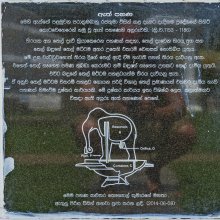Navati, Nāvāti: 15 definitions
Introduction:
Navati means something in Buddhism, Pali, Hinduism, Sanskrit, Marathi, biology, Tamil. If you want to know the exact meaning, history, etymology or English translation of this term then check out the descriptions on this page. Add your comment or reference to a book if you want to contribute to this summary article.
Navati has 14 English definitions available.
Images (photo gallery)
Languages of India and abroad
Sanskrit dictionary
[Deutsch Wörterbuch]
Source: Cologne Digital Sanskrit Dictionaries: Böhtlingk and Roth Grosses Petersburger WörterbuchNavati (नवति):—(von navan) f. neunzig [Pāṇini’s acht Bücher 5, 1, 59.] [Amarakoṣa 2, 9, 84.] āśī.yā nava.yā yāhya.vāṅā śa.ena [Ṛgveda 2, 18, 6. 1, 155, 6. 3, 12, 6. 8, 5, 9.] navatiśataṃ stotriyāḥ [Aitareyabrāhmaṇa 3, 41.] [The Śatapathabrāhmaṇa 10, 2, 3, 4.] [Manu’s Gesetzbuch 3, 177.] [Mahābhārata 7, 539.] [Rāmāyaṇa 5, 1, 49.] [Raghuvaṃśa 3, 69.] [Varāhamihira’s Bṛhajjātaka S. 69, 18. 25. 78, 9.] [Bhāgavatapurāṇa 5, 4, 10.] Die Zahl neunundneunzig wird als eine unbestimmte grosse Zahl gebraucht, z. B. von den Burgen des Śaṃbara u. Anderer. [Ṛgveda 2, 19, 6. 4, 26, 3. 7, 19, 5. 99, 5. 8, 82, 2.] von Feinden [1, 84, 13.] von Rossen [4, 48, 4.] na.abhi.vājairnava.ī ca [10, 39, 9.] nava nava.iṃ ca bā.ūn [?2, 14, 4. Nach Śabdaratnāvalī im Śabdakalpadruma] auch navatī .
Source: Cologne Digital Sanskrit Dictionaries: Sanskrit-Wörterbuch in kürzerer FassungNavati (नवति):—f. neunzig.
Sanskrit, also spelled संस्कृतम् (saṃskṛtam), is an ancient language of India commonly seen as the grandmother of the Indo-European language family (even English!). Closely allied with Prakrit and Pali, Sanskrit is more exhaustive in both grammar and terms and has the most extensive collection of literature in the world, greatly surpassing its sister-languages Greek and Latin.
See also (Relevant definitions)
Starts with: Navatidha, Navatidhanus, Navatika, Navatikai, Navatikoti, Navatiprakrama, Navatiratha, Navatirupatimahatmya, Navatiruppati, Navatishas, Navatishata, Navatitama, Navatittha.
Ends with (+61): Abhijnavati, Ajinavati, Ancanavati, Anjanavati, Antarmanavati, Arunavati, Ashtanavati, Avakumthanavati, Banavati, Bharanavati, Bhutakaranavati, Binnanavati, Brahmanavati, Candanavati, Carunavati, Caturnavati, Chandanavati, Charunavati, Chaturnavati, Dhanavati.
Full-text (+27): Navatishas, Navatika, Pancanavati, Navhati, Navhali, Navhala, Navatidha, Trayonavati, Ekanavati, Trinavati, Dvinavati, Saptanavati, Caturnavati, Navanavati, Navata, Shannavati, Navi Navati, Navi-navati, Saptanavatitama, Navatirupatimahatmya.
Relevant text
Search found 9 books and stories containing Navati, Navatī, Nāvāti; (plurals include: Navatis, Navatīs, Nāvātis). You can also click to the full overview containing English textual excerpts. Below are direct links for the most relevant articles:
Garga Samhita (English) (by Danavir Goswami)
Verse 6.19.2 < [Chapter 19 - In the First Fortress of Dvārakā, the Glories of Līlā-sarovara, etc.]
Rig Veda (translation and commentary) (by H. H. Wilson)
Vedic influence on the Sun-worship in the Puranas (by Goswami Mitali)
Part 38 - Symbolic relevance of the Wheel in Sun-worship < [Chapter 2 - Salient Traits of the Solar Divinities in the Veda]
Part 21 - Viṣṇu (the Deity of the Motion) < [Chapter 2 - Salient Traits of the Solar Divinities in the Veda]
Women in the Atharva-veda Samhita (by Pranab Jyoti Kalita)
6. Goddess Āsurī < [Chapter 4 - Female Deities and the Glorification of Women in the Atharvaveda]
Rivers in Ancient India (study) (by Archana Sarma)
3(a). The river Sarasvatī in the Atharvaveda-saṃhitā < [Chapter 2 - The Rivers in the Saṃhitā Literature]
4. Descriptions of Waters and rivers < [Chapter 1 - Introduction]
Warfare and Military System in Vedic Literature (by Rinki Deka)
Fortification and Siegecraft < [Chapter 2 - Military System as Revealed in the Vedic Texts]
Composition of Army < [Chapter 2 - Military System as Revealed in the Vedic Texts]

